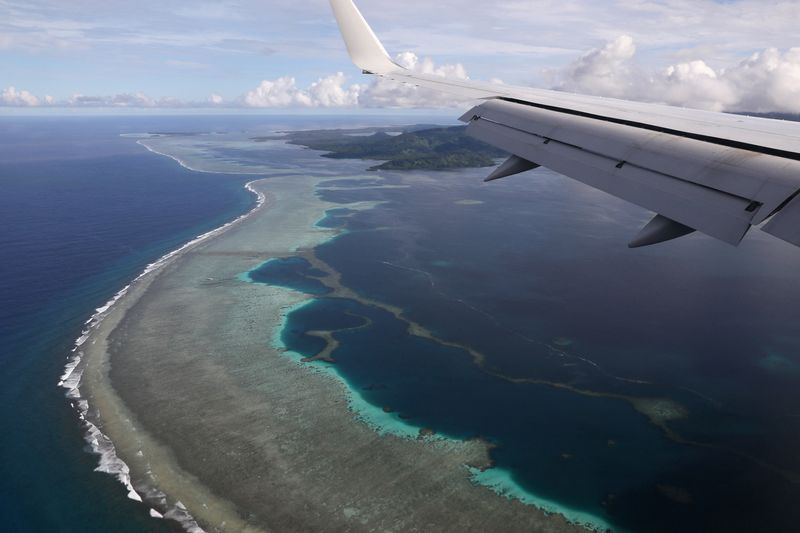By Michael Martina and David Brunnstrom
WASHINGTON (Reuters) – U.S. budget wrangling could further delay funding approval for new agreements with Pacific island nations meant to counter Chinese influence, creating an opportunity for Beijing in the strategically vital region, congressional and other sources say.
After years of painstaking negotiations, the Biden administration signed new 20-year funding programs this year for the Federated States of Micronesia (FSM), the Marshall Islands (RMI) and Palau under which Washington is responsible for their defense and provides economic assistance, while gaining exclusive military access to strategic swathes of the Pacific.
After failing to secure funding earlier this year, lawmakers proposed including $2.3 billion for those programs, called the Compacts of Free Association (COFA), in the National Defense Authorization Act (NDAA), which is currently being negotiated.
But congressional sources say this looks impossible as lawmakers argue over spending priorities, raising concerns that a further delay could create an opening for China, which has been wooing financially strapped Pacific economies.
A congressional staffer familiar with the debate told Reuters that House Republicans from the Natural Resources and Foreign Affairs committees had said the COFA package must be offset by funding cuts elsewhere to get it over the finish line in the NDAA, which would authorize a record $886 billion in spending for 2024.
“We had all been working towards getting it included in the NDAA. Ultimately, when push came to shove, the offset issue was not resolved,” the source said.
New Republican House Speaker Mike Johnson’s office had “doubled down” and the COFA package had now dropped out of consideration for the NDAA because of the unresolved offset demands, the source said.
“It’s feeling pretty dead in the NDAA context,” the source said, adding that focus had turned to finding other legislation to secure the COFA funding.
One possibility is the Biden administration’s supplemental budget request, said the staffer. The fate of that request, which covers foreign policy priorities such as Ukraine and the war in the Middle East, remains uncertain.
Johnson’s office did not respond to requests for comment.
The State Department and White House National Security Council also did not respond.
A protracted delay would be particularly troublesome for Palau, which had been counting on new COFA funds to make up budget shortfalls and where calls for deals with China have been on the rise, the sources said.
Joseph Yun, chief U.S. negotiator for the renewed COFA deals, told Reuters U.S. credibility was at stake. He said the COFA agreements essentially provided for the northern half of the Pacific between Hawaii and the Philippines to remain under U.S. defense control and failure to move forward could be “strategically disastrous.”
“It is really incomprehensible given the amount we’re talking about … why Congress cannot get its act together,” Yun said.
“What we risk is China getting in where we really don’t want them – in places like Palau, RMI, FSM. And they have a history of doing that,” he said. “We’re … making the situation quite dangerous by not enacting the compacts.”
(Reporting by David Brunnstrom, Michael Martina and Patricia Zengerle in Washington; Editing by Don Durfee and Daniel Wallis)
